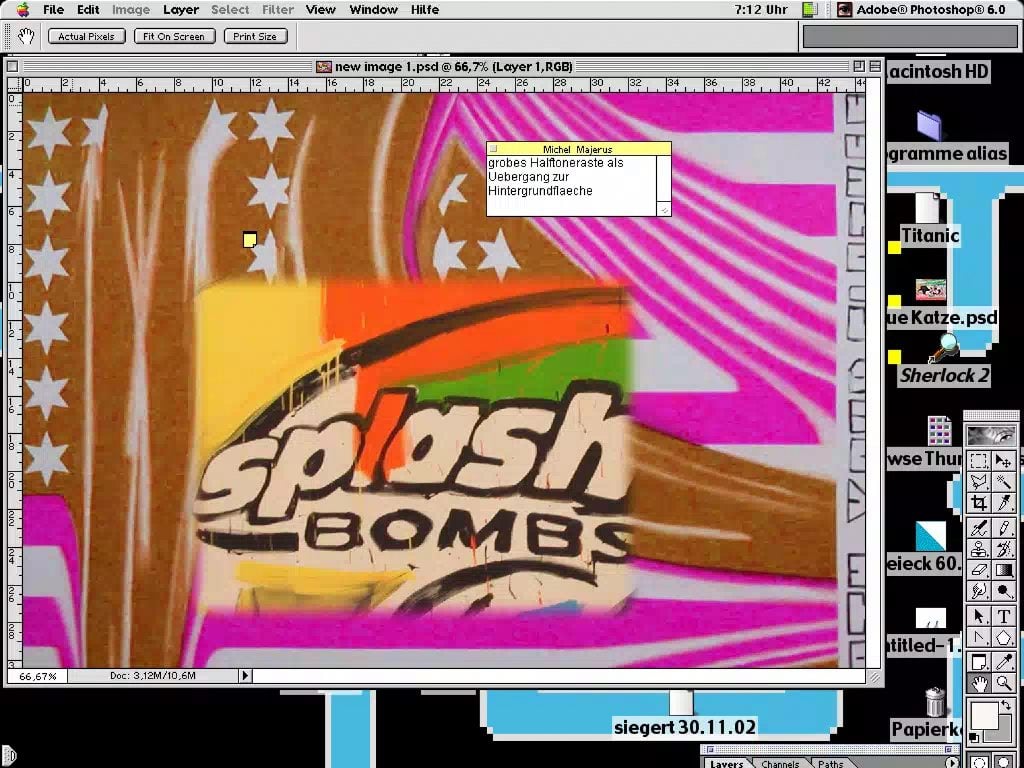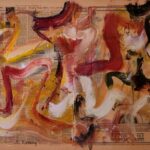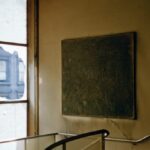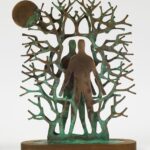On November 6, 2002, when a Luxair plane crashed while attempting to land at Luxembourg Airport, 20 passengers were killed. Among them was the Luxembourgish artist Michel Majerus, who at 35 had already won international acclaim for playful and incisive paintings that borrow from advertising, video games, record covers, art history, and a vast array of other sources.
Since then, Majerus’s reputation has continued to grow, with younger artists like Jamian Julinao-Villani and Egan Frantz citing him as an influence. In 2022, the Institute of Contemporary Art, Miami hosted a Majerus survey, and five German museums and art spaces staged shows devoted to his work, which ranges from icy text paintings that recall techno CDs to deadpan abstractions to a half-pipe emblazoned with computer graphics. His longtime Berlin gallery, Neugerriemschneider, and the New York-based Matthew Marks, have been guiding his work into key collections.
Now a sprawling body of material that details how Majerus made his trailblazing art has become available. His laptop was recovered from the plane crash and has been restored as part of a thrillingly multifarious project that involves his estate, the artist Cory Arcangel, a longtime Majerus fan, and the digital-art organization Rhizome. Arcangel has created an ongoing YouTube series titled “Let’s Play Majerus G3,” and is in a joint exhibition with Majerus (of the same name) that is running through the middle of next March at the estate’s Berlin home, the artist’s former studio.
“It wasn’t even known whether anything would work,” Arcangel said in a video interview from Stavanger, Norway, where he’s based. “We worked on the project for many years, knowing that it could have just been a big dud. The hard drive could have been corrupted beyond bootable form.”
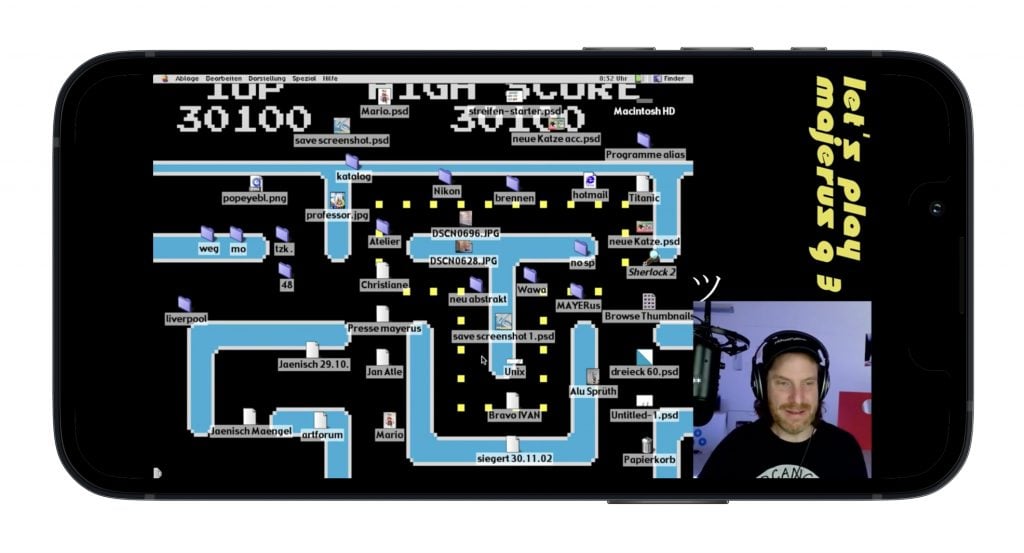
Cory Arcangel, Let’s Play Majerus G3!, 2024. © Cory Arcangel and Michel Majerus Estate, 2024/Courtesy Cory Arcangel, Michel Majerus Estate and Rhizome
A Tour Into the Past
Mercifully, it was not corrupted, and Dragan Espenschied, Rhizome’s preservation director, went about figuring out how to make the laptop run exactly as it did in the past on a contemporary computer, a potentially thorny process known in the tech trade as emulation. “It can work again if the stars align,” Espenschied said, speaking from his home in Stuttgart, Germany.
The two men have experience with such projects. They emulated a Macintosh computer that Arcangel bought at a Salvation Army store in 2005, finding a homemade game on it called Bomb Iraq. The artist also helped rescue digital Andy Warhol pieces stored on decades-old floppy discs held by the Andy Warhol Museum in Pittsburgh.
However, the contents of Majerus’s laptop are on an entirely different scale. “It’s a true virtual studio—a true studio,” Arcangel said. There are files related to shows he never realized, his final solo exhibition, in 2002, at Petzel gallery in New York, “almost from start to finish,” a bevy of source images he used, “and photographs he’s taken with his Nikon camera, out and about.”
On YouTube, Arcangel has released the first video walkthrough of the laptop, a Macintosh G3 Wall Street—“the Ferrari of its day,” as he says. Inspired by popular YouTube channels that do song or chess analysis, Arcangel offers lucid commentary as he clicks through folders and discusses Majerus’s practice for a general audience. He also hams it up a bit. “If you’re wondering why this is all taking so long, that’s how life was in the ‘90s,” he says, firing up the emulation and waiting for Mac OS 9 load. “Computers were slow!”
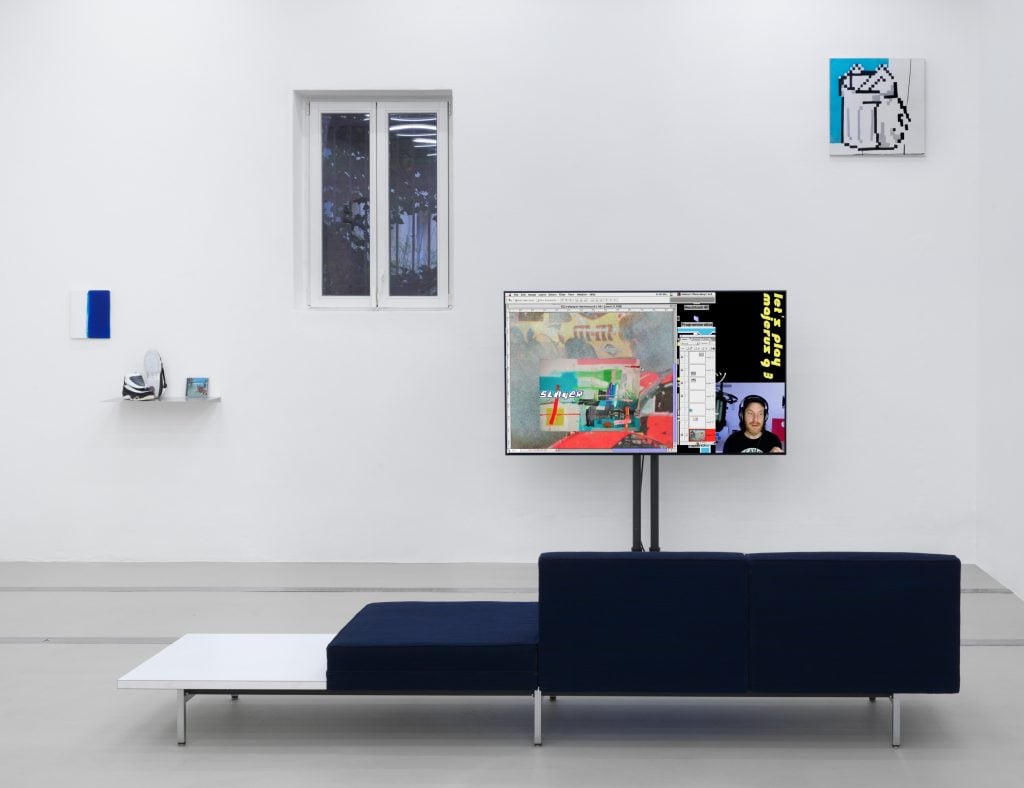
Installation view of “Let’s Play Majerus G3,” a project by Cory Arcangel at the Michel Majerus Estate in Berlin, April 27, 2024–March 15, 2025. © Michel Majerus Estate, 2024/© Cory Arcangel, 2024/Photo: Jens Ziehe, Berlin.
Opening Photoshop 6.0 in the emulation, Arcangel reveals, layer by layer, how Majerus built some images, and how he created digital mock-ups for his exhibitions. “You see the full sausage being made, so to speak,” Arcangel told me. Not everything that was on the laptop is accessible, though. Majerus’s family removed items that they deemed too personal. “If you’re looking for some hot gossip, you’re not going to find it here,” Arcangel cautions his viewers.
A New View on Majerus
What is clear is that Majerus was something of a computer power user. “You turn it on, and you immediately see [that it] is heavily customized,” Espenschied said. “Everything that could be changed and configured in the system was changed to look different. The system typeface was like a huge, cartoonish-looking, almost handwritten typeface.”
Even for those knew Majerus, or who have studied his practice closely, there have been discoveries. “We were surprised by how many photographs he took,” said Ruth Kißling, the director of the Michel Majerus Estate, which oversees his archives and runs its exhibition space. “There’s an endless mass of photographs.” One poignant photo, which Arcangel pulls up on screen on YouTube, shows Majerus’s laptop sitting on a hotel bed: a behind-the-scenes glimpse of an artist on the road, perhaps taking a break from work.
“He had a computer, and he used it, but he never spoke about it,” Tim Neuger, a cofounder of Neugerriemschneider, told me. As Neuger sees it, “it’s a dimension that we’re not really able to grasp yet, the dimension that Cory is laying open.”
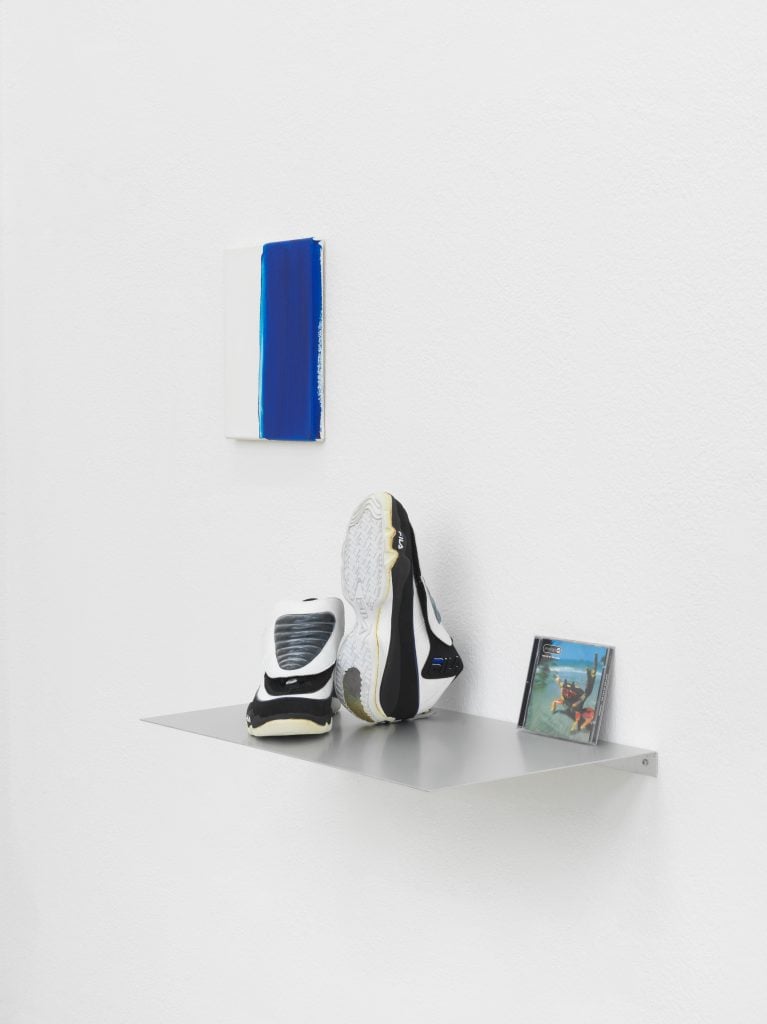
Michel Majerus, Lettin’ off as much as you can, 1997. © Michel Majerus Estate, 2024/Courtesy private collection and neugerriemschneider, Berlin.
What would Majerus make of all this? “Michele would have been enormously pleased and happy,” Neuger said, “that such a wonderful figure like Cory would do a YouTube tutorial on him, not an art-historical text but a YouTube tutorial, a new thing.”
Arcangel likened the experience of looking through the laptop to “going to Pollock’s studio. It’s very similar, but it’s just a virtual version.” Once it was operational, he began spending an hour or two every morning on it. “There’s no organization so I could just like systematically understand it,” he said. “I had to learn it like a language. I had to just go in a little bit every day and just immerse myself in it.”
While Arcangel develops new episodes of the YouTube program, a total of eight works by the two artists are on view in the Berlin exhibition, including one astonishing Majerus piece that unites a small abstract painting, a pair of Fila sneakers, and the hit Prodigy album The Fat of the Land (1997) on CD—an ode to shifting tastes and disposable consumerism.
“He was really, really at the edge of something that was happening, and not many artists were in the league that he was in,” Arcangel said. Majerus’s laptop, he went on, “could show us what studios are going to look like in the future. This is what art history will be in the future, undeniably.”
Follow Artnet News on Facebook:
References: this article is based on content originally published by Andrew Russeth on Artnet. You can read the full article here.
